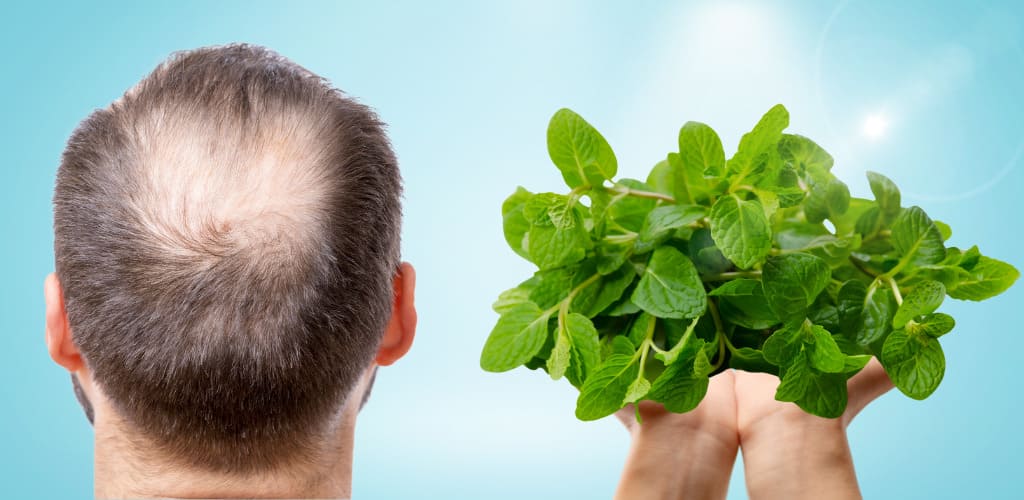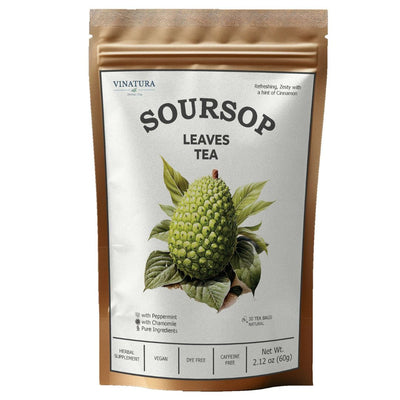
Benefits Of Spearmint For Hair & Scalp: Does Spearmint Block DHT?
Spearmint has gained attention not just for its refreshing flavor but also for its potential benefits in hair and scalp health, particularly in its ability to block Dihydrotestosterone (DHT), a hormone linked to hair loss.
This short guide explores the scientific backing behind spearmint's effects on hair health, offering insight into how this natural remedy could be a game-changer in hair care routines.
Before exploring further, please read the disclaimer located at the end of this webpage.
Does Spearmint Block DHT?
Dihydrotestosterone (DHT) is an androgen hormone widely known for its role in hair loss among individuals of all genders.
While there's been much debate on various herbs, especially peppermint - a close relative of spearmint - and their potential to reduce DHT levels, concrete proof of spearmint's direct DHT-blocking ability is limited.
Despite this, insights from peppermint studies suggest a promising impact, although not a complete eradication of DHT [3].
This places spearmint as a potentially advantageous, though not definitive, natural option for those addressing hair health concerns associated with DHT.
You may also like: Is Spearmint Good for Acid Reflux?
Is Spearmint Good for Hair?
When it comes to enhancing both appearance and self-esteem, healthy hair plays a crucial role for people of all genders. Given the significance placed on hair health, many seek natural ways to maintain it.
Spearmint, while not a cure-all, has been celebrated for its positive impact on hair health through various mechanisms.
Spearmint boasts anti-inflammatory and antifungal properties, aids in hormonal balance, and has calming effects on the mind, making it a natural ally in the pursuit of strong, vibrant hair.
Below, there is more detailed information on the benefits of spearmint for hair.
What Are the Benefits of Spearmint for Hair & Scalp?
Spearmint May Reduce Hair Loss

Hair loss manifests for myriad reasons, including stress, hair follicle inflammation, or fungal infections [4,5]. Spearmint emerges as a nurturing remedy, offering mechanisms to mitigate these issues:
Anti-inflammatory Properties: Spearmint includes carvone, a compound recognized for its anti-inflammatory properties [1].
Though direct studies on hair follicle inflammation are scarce, the anti-inflammatory traits of spearmint could theoretically safeguard hair follicles against inflammation, contributing to a healthier scalp and hair.
Antifungal Benefits: Hair compromised by fungal infections may weaken, leading to loss. Spearmint's components, such as cis-carveol and carvone, possess antifungal capabilities, aiming to thwart the conditions that cause hair to weaken and break [2].
Mental Well-being: Recognized for its calming essence, spearmint is often consumed daily for its positive impact on mental health and emotional balance.
This soothing effect can reduce stress levels, indirectly benefiting hair health and preventing stress-induced hair loss.
Related Article: Does Spearmint Lower Testosterone?
Spearmint Is Effective On PCOS's Hair Symptoms

Spearmint serves as an effective natural remedy in addressing hair symptoms associated with Polycystic Ovary Syndrome (PCOS) by functioning as an androgen antagonist.
Spearmint helps in moderating hormonal imbalance, significantly reducing testosterone levels while enhancing the production of hormones essential for ovulation, such as Follicle Stimulating Hormone (FSH) and Luteinizing Hormone (LH) [1].
This hormonal adjustment not only aids in managing PCOS but also mitigates related hair issues, offering relief to those affected by this condition.
Why Is Spearmint Used In Hair Care Products Popularly?
Spearmint's surge in popularity within hair care products stems from its proven efficacy in enhancing hair and scalp health.
Its diverse benefits, attributed to its anti-inflammatory and antifungal properties, play a significant role in reducing hair loss and addressing scalp concerns.
Moreover, spearmint infuses a rejuvenating and delightful fragrance into hair care items, making it a top pick among consumers for its aromatherapeutic attributes.
Furthermore, spearmint's simple cultivation and wide availability render it a convenient choice for manufacturers and consumers seeking to include natural elements in their hair care regimens.
This blend of effectiveness, sensory delight, and accessibility cements spearmint's status as a favored component in formulating hair care goods.
How to Use Spearmint for Hair Care Effectively?
Using Fresh Spearmint At Home

While fresh spearmint may not contain high levels of active compounds, integrating it into daily routines can gradually enhance hair health.
One effective approach involves regularly drinking spearmint tea, harnessing its holistic benefits for vibrant hair.
Alternatively, craft a natural spearmint-infused shampoo by drying fresh leaves and blending them with nourishing ingredients like aloe vera gel or dried grapefruit peel.
Boil this blend in water for 10-15 minutes, then let it cool to a suitable temperature for a gentle, rejuvenating hair cleanse.
With its gentle nature, this DIY shampoo is suitable for daily use, fostering smoother and stronger hair over time.
Related Article: Does Spearmint Help With Nausea?
Using Spearmint Hair Care Products

For those who prefer simplicity or the convenience of ready-made solutions, the market offers a variety of hair care products infused with spearmint.
These products include shampoos and conditioners designed to harness the healing properties of spearmint, as well as specialized options like dry shampoo for quick touch-ups.
Additionally, spearmint hair oil provides intensive nourishment to the scalp and hair, while spearmint extract masks offer deep conditioning benefits.
Customized spearmint hair treatments address specific issues such as hair loss or scalp irritation. Each product combines the natural potency of spearmint with other beneficial ingredients to ensure your hair receives the care it deserves.
Taking Spearmint Supplements to Nurture Inside's Body

To enhance hair health comprehensively, consider integrating spearmint supplements into your daily routine alongside topical treatments and spearmint-infused hair care products.
It's crucial to procure these supplements from reputable manufacturers to ensure quality and effectiveness.
Opting for inferior supplements can not only lead to unsatisfactory results but may also pose risks. Hence, always validate the source of your spearmint supplements.
Additionally, experts suggest a daily intake of around 1000mg of spearmint for optimal benefits.
This dosage aims to harness spearmint's properties to balance hormone levels and promote hair and scalp health, avoiding excessive consumption.
Remember, achieving the best results with spearmint for hair necessitates a consistent and measured approach, adhering to the recommended dosage for safe and efficient utilization.
Conclusion
Although most studies have focused on the benefits of peppermint for hair health, spearmint - a relative of peppermint - may also have similar properties.
Spearmint's effects on hair may be due to its anti-inflammatory, anti-fungal, and hormone-balancing properties, especially its ability to balance the mind and relieve stress.
This could be seen as a new potential for application in hair care products. However, spearmint is not a comprehensive solution for hair problems.
References
- [1] Chandra Joshi, D., Baghla, A., Luxmiyeasmin, & Krati, K. (n.d.). Role Of Mentha Spicata (Spearmint). Journal of Pharmaceutical Negative Results ¦, 13. https://doi.org/10.47750/pnr.2022.13.S10.208
- [2] Mahendran, G., Verma, S. K., & Rahman, L.-U. (2021). The traditional uses, phytochemistry and pharmacology of spearmint (Mentha spicata L.): A review. Journal of Ethnopharmacology, 278, 114266. https://doi.org/10.1016/j.jep.2021.114266
- [3] Uchiumi, Y., Yamamoto, S., & Mizutani, K. (2004). Activity of herbal extracts on the control of sebum secretion. FRAGRANCE JOURNAL, 32, 53–57. https://www.tib.eu/en/search/id/BLSE%3ARN148543859/Activity-of-herbal-extracts-on-the-control-of-sebum/?tx_tibsearch_search%5Bsearchspace%5D=tn
- [4] HARRISON, S., & BERGFELD, W. (2009). Diffuse hair loss: Its triggers and management. Cleveland Clinic Journal of Medicine, 76(6), 361–367. https://doi.org/10.3949/ccjm.76a.08080
- [5] Sadick, N. S., Callender, V. D., Kircik, L. H., & Kogan, S. (2017). New Insight Into the Pathophysiology of Hair Loss Trigger a Paradigm Shift in the Treatment Approach. Journal of Drugs in Dermatology: JDD, 16(11), s135–s140. https://pubmed.ncbi.nlm.nih.gov/29141068/
Author

Product Disclaimer
Including an ingredient or study does not evaluate, endorse, or recommend any Vinatura product or any third-party product. Some ingredients discussed may not be used in any Vinatura product.
The content of the articles has not been evaluated by the Food and Drug Administration (FDA) and is not intended to promote or endorse any specific product. Any products sold on this website are not intended to diagnose, treat, cure, or prevent any disease.
Opinions and Endorsements
Any claims, statements, or opinions expressed in the articles are those of the author(s) and do not necessarily reflect the views or opinions of the manufacturers of the dietary supplement products. The products sold on this website are separate from the content of the articles and are not directly endorsed or associated with the information presented here.
Liability Disclaimer
The author(s) of the articles, website, and manufacturers of the dietary supplement products do not assume any liability for any potential consequences arising from the use of the information provided in the articles. Ingredient effects, dosages, and safety vary by individual, formulation, and context; some ingredients interact with medications or may be unsuitable during pregnancy or lactation. It is recommended that individuals consult with a qualified healthcare professional before making any dietary or lifestyle changes, including the use of dietary supplements.
Product Usage
Please refer to the product labels and packaging for specific usage instructions and guidelines for the dietary supplement products sold on this website.
Customer Support
For any concerns or questions regarding the dietary supplement products, please contact our customer support team, who will be more than happy to assist you.





Leave a Comment
Be the first to comment.
What do you think?